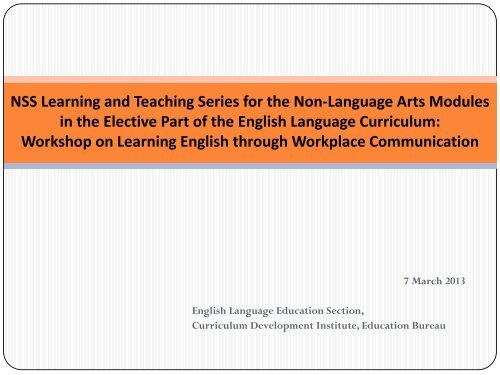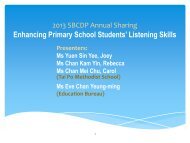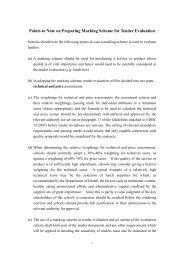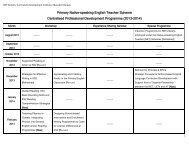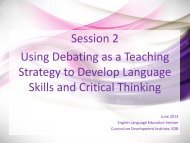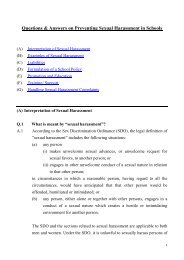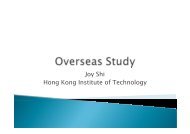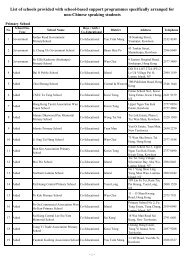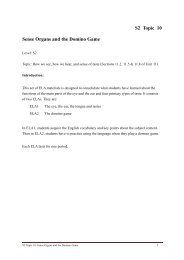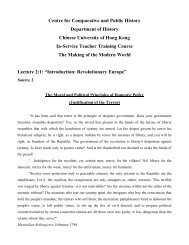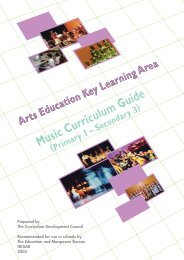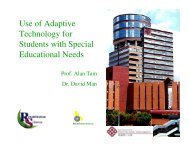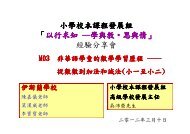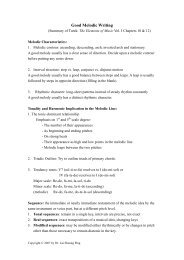text-types
text-types
text-types
Create successful ePaper yourself
Turn your PDF publications into a flip-book with our unique Google optimized e-Paper software.
NSS Learning and Teaching Series for the Non-Language Arts Modules<br />
in the Elective Part of the English Language Curriculum:<br />
Workshop on Learning English through Workplace Communication<br />
7 March 2013<br />
English Language Education Section,<br />
Curriculum Development Institute, Education Bureau
• a better understanding of the module ‘Learning English<br />
through Workplace Communication’ in the Elective Part<br />
of the three-year senior secondary English Language<br />
curriculum;<br />
• gained some ideas on how to plan the module, in<br />
particular how it could be integrated with the<br />
Compulsory Part using the task-based approach for<br />
extending students’ knowledge of <strong>text</strong>-<strong>types</strong> prominent<br />
in daily life as well as skills for comprehension and<br />
production of similar <strong>text</strong>s;<br />
2
• learnt more about how to develop learning and<br />
teaching activities/materials for the<br />
implementation of the module;<br />
• acquired some strategies for teaching the module<br />
and the use of assignments, assessment and<br />
feedback for improving learning and teaching; and<br />
• shared your experience in planning/implementing<br />
the module or related learning and teaching<br />
activities with other participants.<br />
3
Part 1<br />
Part 2<br />
Understanding the module<br />
Designing workplace-related classroom activities<br />
BREAK<br />
Part 3 Possible approaches to implementing the module<br />
LUNCH (12.30-13.45)<br />
Part 4 Strategies in planning and implementing the module<br />
Part 5 Assessing students’ learning in the module: Part 1<br />
BREAK<br />
Part 6 Assessing students’ learning in the module: Part 2<br />
4
Ask three of the participants who are not in your group<br />
the following questions:<br />
1. What is your name?<br />
2. Which school are you from?<br />
3. Does your school offer “Workplace Communication”<br />
as one of the elective modules? Why/Why not?<br />
4. Why do you attend this workshop?
Which of the following picture/diagram do you think best<br />
illustrates the relationship between the Compulsory Part<br />
and the Elective Part? Explain your choice.<br />
7
• provide opportunities for learners to apply,<br />
consolidate and extend the language knowledge<br />
and skills that they have acquired from the<br />
Compulsory Part<br />
• cater for learners’ diverse abilities, needs and<br />
interests<br />
• extend and enrich learners’ learning experience<br />
• add variety to the language curriculum<br />
8
Activity 1: What are the overall objectives of the module<br />
‘Learning English through Workplace Communication’?<br />
9
Activity 1: What are the overall objectives of the module<br />
‘Learning English through Workplace Communication’?<br />
• To familiarise learners with different <strong>types</strong> of workplace<br />
correspondence<br />
• To develop learners’ understanding of the vocabulary,<br />
language, formats, styles and conventions used in spoken<br />
and written communication in the workplace<br />
• To help learners to apply the knowledge and skills they<br />
have learned in their production of workplace-related <strong>text</strong>s<br />
• To enhance learners’ ability to carry out workplace-related<br />
activities through providing them with opportunities to<br />
practise and demonstrate their language and<br />
communication skills in simulated tasks<br />
10
Suggested learning focuses of the module<br />
(from the Suggested Schemes of Work for the Elective part of<br />
the Three-year Senior Secondary English Language Curriculum)<br />
Suggested no. of lessons: 50<br />
•Building knowledge and vocabulary of different trades/businesses<br />
•Starting a scrapbook of a selected trade/business<br />
•Concepts relating to organisations<br />
•Handling business telephone calls<br />
•Memo writing<br />
•Conventions and style of business letters<br />
•Handling complaints<br />
•Planning the final project<br />
11
Suggested learning focuses of the module<br />
(from the Suggested Schemes of Work for the Elective part of<br />
the Three-year Senior Secondary English Language Curriculum)<br />
•Making sales presentations<br />
•Producing sales/promotional materials<br />
•Setting up and holding meetings, and preparing minutes<br />
•Job interviews<br />
•Quiz on general business knowledge<br />
•Sharing ideas on business ethic<br />
•Final display<br />
12
Target knowledge, skills and attitudes<br />
Students are able to:<br />
• Understand English telephone etiquette<br />
• Handle telephone calls in a professional manner<br />
• Apply strategies of establishing and maintaining<br />
relationships in telephone English<br />
13
Target knowledge, skills and attitudes<br />
Students are able to:<br />
• write memos in English<br />
• demonstrate an understanding of the need to be<br />
succinct in memo writing<br />
• understand and apply strategies of politeness<br />
and tact<br />
14
Activity 2a<br />
In your group,<br />
a) write down as many <strong>text</strong>-<strong>types</strong> as<br />
you can think of that are related<br />
to workplace communication;<br />
b) circle the <strong>text</strong>-type that you hear;<br />
and<br />
c) raise your hand when you have<br />
circled 4 <strong>text</strong>-<strong>types</strong> in a row!<br />
16
Activity 2b<br />
Which of the following are SPOKEN <strong>text</strong>-<strong>types</strong> and which of them<br />
are WRITTEN <strong>text</strong>-<strong>types</strong>? Circle the SPOKEN <strong>text</strong>-<strong>types</strong> below.<br />
memo resume webpage<br />
note/message<br />
formal letter<br />
conversation/<br />
telephone conversation<br />
email advertisement form/table/chart<br />
agenda proposal meeting/discussion<br />
minutes survey/report article<br />
interview<br />
public speech /<br />
presentation<br />
pamphlet/leaflet/<br />
flyer/poster<br />
17
• The <strong>text</strong>-<strong>types</strong> that I have circled above could be<br />
used to help develop my students’ speaking and<br />
listening skills.<br />
• The <strong>text</strong>-<strong>types</strong> that I have NOT circled above could<br />
be used to help develop my students’ reading and<br />
writing skills.<br />
• To facilitate the development of all the four<br />
language skills, students should be exposed to a<br />
balanced variety of written and spoken <strong>text</strong>-<strong>types</strong>.<br />
18
Different <strong>text</strong>-<strong>types</strong> provide meaningful con<strong>text</strong>s<br />
for the learning and purposeful use of language<br />
knowledge and skills. Conscious learning and<br />
explicit, systematic teaching of different <strong>text</strong>-<strong>types</strong>,<br />
including the features they involve, enable learners<br />
to become more proficient language users.<br />
19
Activity 3a<br />
In both spoken and written <strong>text</strong>-<strong>types</strong> for workplace<br />
communication, formulaic expressions are often used.<br />
What are the language functions of the expressions below?<br />
20
To ask for favour/assistance<br />
Could you please…?<br />
Would you mind ~ing…?<br />
I should be grateful if you would…<br />
I would appreciate it if you could…<br />
To respond to requests/complaints<br />
To make enquiries<br />
May I ask/know…?<br />
I am writing to enquire about…<br />
I should be grateful if you could inform me of…<br />
With reference to your request for…<br />
I am writing in response to your letter…<br />
Should you have any further queries, please do not hesitate to contact…<br />
21
To give a presentation<br />
First of all, …<br />
I would like to conclude with the following suggestions:…<br />
To summarise what I have said,…<br />
To give advice/suggestions<br />
We recommend that…<br />
May I suggest that we…?<br />
Perhaps you could…<br />
To explain a purpose<br />
I am writing to…<br />
The reason I’m calling is that…<br />
The purpose of our meeting today is…<br />
To show agreement/disagreement<br />
You’re absolutely correct.<br />
I’m afraid I cannot agree with you because…<br />
It seems a good idea but maybe we could…<br />
22
Activity 3b<br />
In what ways are expressions softened to<br />
become more polite? Identify three different<br />
ways used in the expressions in Activity 3a.<br />
•using modals (e.g. would, could, may, should)<br />
•using questions instead of direct statements<br />
(e.g. Could you please…?, May I …?)<br />
•using adverbials of probability (e.g. perhaps,<br />
maybe)<br />
23
To enable students to comprehend and produce<br />
a range of spoken and written <strong>text</strong>-<strong>types</strong> related<br />
to workplace communication, it is important to<br />
familiarise students with:<br />
• words/expressions for different language<br />
functions<br />
• the appropriate register (i.e. degree of<br />
formality) for communicating politely<br />
24
Activity 4a<br />
With your partner, brainstorm as many jobs as<br />
you can and list them below.<br />
25
-based on General Social Survey by the National Organization for Research at the<br />
University of Chicago<br />
26
10. elephant dung inspector 5. stage performer’s assistant<br />
9. animal masturbator 4. skyscraper window cleaner<br />
8. animal pregnancy tester 3. sewers cleaner<br />
7. road-kill remover 2. guard at Buckingham Palace<br />
6. carcass cleaner 1. janitor at a dirty theatre<br />
from www. smashinglists.com<br />
27
property agent<br />
tour guide<br />
wedding planner<br />
dancer<br />
veterinarian<br />
yoga instructor<br />
playgroup leader<br />
travel blogger<br />
babysitter<br />
web developer<br />
hair stylist<br />
acupuncturist<br />
cartoonist<br />
nutritionist<br />
herbalist<br />
headhunter<br />
28
Activity 4b<br />
In your group, brainstorm as many work-related<br />
situations as you can in which people with the following<br />
jobs may need to use (i.e. read, write, listen or speak).<br />
Group 1: nurse, tour guide<br />
Group 2: bank teller, web designer<br />
Group 3: chef, waiter/waitress<br />
Group 4: police inspector, customs officer<br />
Group 5: beautician, gym trainer<br />
Group 6: salesperson, ambulance man<br />
29
Example 1 – Singer<br />
With whom? When?<br />
Possible situations:<br />
• talk with overseas investors, counterparts and fans<br />
• attend interviews conducted by English-speaking<br />
media<br />
• attend social gatherings with English-speaking<br />
participants<br />
• sing English songs at special events (and read English<br />
lyrics)<br />
• listen to songs from English-speaking countries<br />
30
Example 2 – Barista at coffee shop<br />
Possible situations:<br />
• reading information of products in English<br />
• introducing products to English-speaking<br />
customers<br />
• listening and responding to the requests or<br />
questions from English-speaking customers<br />
31
Activity 5<br />
Read through the three learning activities given to you<br />
and identify the following:<br />
• Job: ____________________________<br />
• Place of work:<br />
________________________________________<br />
• Purpose of activity: __________________________<br />
• Language skills involved (circle): reading / writing /<br />
listening / speaking<br />
• Text-type(s) involved:<br />
_______________________________________<br />
32
Learning Activity 1<br />
Job: customer service representative<br />
Place of work: Magical Tour Bus Company<br />
Purpose of activity:<br />
to respond to a complaint about<br />
the company’s day trip from an<br />
important client<br />
Language skills involved (circle): reading and writing<br />
Text-type(s) involved: complaint letter, letter of reply<br />
33
Learning Activity 2<br />
Job: concierge<br />
Place of work:<br />
Purpose of activity:<br />
Language skills involved (circle):<br />
Text-type(s) involved:<br />
a five-star hotel in TST<br />
to recommend a well-known Chinese<br />
restaurant to a guest<br />
reading and speaking<br />
webpage and presentation<br />
34
Learning Activity 3<br />
Job: secretary<br />
Place of work: Mavis Company<br />
Purpose of activity:<br />
to write memos to a few<br />
colleagues on behalf of your boss<br />
Language skills involved (circle): listening and writing<br />
Text-type(s) involved: telephone conversation, memo<br />
35
Many tasks in real-life workplace situations<br />
involve the integrative use of language skills and<br />
strategies. Based on these situations, a variety of<br />
learning activities that are relevant to learners’<br />
abilities and interests and cover a range of <strong>text</strong><strong>types</strong><br />
could be designed to facilitate the<br />
integrative use of an extensive range of language<br />
knowledge and skills in the module “Learning<br />
English through Workplace Communication”.<br />
36
While Modules, Units and Tasks are to be adopted for<br />
organising learning and teaching in the Compulsory Part,<br />
the modules in the Elective Part may not necessarily<br />
follow the M-U-T structure. However, the general<br />
approach to teaching the modules in the Elective Part<br />
remains task-based – that is, teachers are encouraged to<br />
continue with the principles and practices associated with<br />
task-based learning, namely using learner-centred<br />
instruction, providing opportunities for meaningful and<br />
purposeful communication and promoting integrative and<br />
creative uses of language.<br />
English Language Curriculum and Assessment Guide (Secondary 4-6), p.54<br />
39
• Provides con<strong>text</strong>s for<br />
– integrated use of language skills<br />
– meaningful and purposeful use of English for<br />
communication<br />
• Facilitates effective grammar learning and<br />
teaching<br />
• Uses learning and teaching resources of a<br />
variety of <strong>text</strong>-<strong>types</strong><br />
• Promotes a learner-centred approach<br />
40
Con<strong>text</strong><br />
Purpose<br />
Involves learners in<br />
thinking and doing<br />
Product<br />
Requires learners to<br />
draw upon a<br />
framework of<br />
knowledge and skills<br />
41
Con<strong>text</strong>?<br />
Purpose?<br />
You are a job seeker. You have enrolled for a course<br />
organised by a career coaching agency which prepares<br />
young people for job seeking. In the course, you will be<br />
trained on how to search for jobs from job ads, apply for<br />
jobs and prepare for job interviews.<br />
Product?<br />
The coach of the course requires you to complete the<br />
following tasks:<br />
1. Searching for a job suitable for yourself<br />
2. Writing a CV and a job application letter<br />
3. Prepare for job interviews<br />
42
Task 1 – Job search<br />
Students have to:<br />
•read sample job ads and learn about their features<br />
•play matching games to understand job duties and requirements<br />
•read job ads from own sources, choose a job that suits them and<br />
explain their choice<br />
Task 2 – Job application<br />
Students have to:<br />
•listen to a presentation about CV writing<br />
•study sample CVs and job application letters<br />
•write a CV<br />
•write a job application letter for the job they have chosen<br />
Task 3 – Job interview<br />
Students have to:<br />
•discuss the possible questions to be asked at job interviews<br />
•prepare written responses to possible questions<br />
•watch video clips on job interview etiquette and skills<br />
•role-play a job interview<br />
43
Task 1 – Job search<br />
Students have to:<br />
•read sample job ads and learn about their features<br />
•play matching games to understand job duties and requirements<br />
•read job ads from own sources, choose a job that suits them and<br />
explain their choice<br />
Task 2 – Job application<br />
Students have to:<br />
•listen to a presentation about CV writing<br />
•study sample CVs and job application letters<br />
•write a CV<br />
•write a job application letter for the job they have chosen<br />
What are the <strong>text</strong>-<strong>types</strong> involved?<br />
Task 3 – Job interview<br />
Students have to:<br />
•discuss the possible questions to be asked at job interviews<br />
•prepare written responses to possible questions<br />
•watch video clips on job interview etiquette and skills<br />
•role-play a job interview<br />
44
Task 1 – Job search<br />
Students have to:<br />
•read sample job ads and learn about their features<br />
•play matching games to understand job duties and requirements<br />
•read job ads from own sources, choose a job that suits them and<br />
explain their choice<br />
Task 2 – Job application<br />
Students have to:<br />
•listen to presentation about CV writing<br />
•study sample CVs and job application letters<br />
•write a CV<br />
•write a job application letter for the job they have chosen<br />
What are the language skills involved?<br />
Task 3 – Job interview<br />
Students have to:<br />
•discuss the possible questions to be asked at job interviews<br />
•prepare written responses to possible questions<br />
•watch video clips on job interview etiquette and skills<br />
•role-play a job interview<br />
45
Task 1 – Job search<br />
Students have to:<br />
•read sample job ads and learn about their features<br />
•play matching games to understand job duties and requirements<br />
•read job ads from own sources, choose a job that suits them and<br />
explain their choice<br />
Task 2 – Job application<br />
Students have to:<br />
•listen to a presentation about CV writing<br />
•study sample CVs and job application letters<br />
•write a CV<br />
•write a job application letter for the job they have chosen<br />
Task 3 – Job interview<br />
Students have to:<br />
What is the language knowledge involved?<br />
•Features of job ads<br />
•Content, language and structure of CVs and<br />
job application letters<br />
•discuss the possible questions to be asked at job interviews<br />
•prepare written responses to possible questions<br />
•watch video clips on job interview etiquette and skills<br />
•role-play a job interview<br />
46
Activity 6<br />
Read the unit overview below and the lesson plan for the unit given to you and fill<br />
in the boxes on your worksheet. Each group member should read the lesson plan<br />
for one of the five tasks and share their ideas in order to complete the table at<br />
the bottom of the worksheet.<br />
Unit: New Face of the Friendly Pet Hotel<br />
You are Chris. You work for the Friendly Pet Hotel in Tsuen Wan,<br />
which provides services mainly for dogs. Recently, your pet hotel<br />
has conducted a customer survey to find out how satisfied the<br />
patrons were with the services provided. The manager, Mr Pat<br />
Smith, has sent you a memo. He wants you to identify the<br />
problems from the patrons’ responses and to make suggestions on<br />
how to improve the hotel services. Write a report on the problems<br />
of the pet hotel and make recommendations to improve the<br />
business.<br />
47
Task 1 • memo<br />
• charts<br />
Text-<strong>types</strong><br />
Language knowledge/skills<br />
Knowledge:<br />
• function and features of a memo<br />
• vocabulary related to services for pets<br />
• quantifiers<br />
Skills: reading, writing<br />
Task 2 • magazine article<br />
• advertisements<br />
• leaflets<br />
Knowledge:<br />
• adjectives and phrases for persuasive writing<br />
• vocabulary about pet services<br />
Skills: reading, vocabulary building<br />
Task 3 • webpages<br />
• discussion<br />
Knowledge:<br />
• vocabulary related to services for pets<br />
Skills: reading, speaking, listening<br />
Task 4 • agenda<br />
• discussion<br />
• presentation<br />
Task 5 • report<br />
• discussion<br />
Knowledge:<br />
• function and features of an agenda<br />
• expressions for group interaction<br />
Skills: reading, speaking, writing, listening<br />
Knowledge:<br />
• structure and language of a report<br />
Skills: reading, speaking, listening<br />
48
Activity 7<br />
In your group, create a short workplace unit consisting of<br />
at least two tasks that involve different <strong>text</strong>-<strong>types</strong> and<br />
language skills.<br />
49
The Compulsory Part<br />
Meaningful use of<br />
Reading/ Writing<br />
Listening/ Speaking<br />
Vocabulary<br />
Text-<strong>types</strong><br />
Grammar Forms &<br />
Communicative<br />
Functions<br />
through exploration of themes in varied con<strong>text</strong>s by adopting<br />
different approaches and strategies<br />
51
‣SBA<br />
‣Elective modules<br />
Integrate: to combine two or more things in order to<br />
become more effective (from the Cambridge Advanced Learner's Dictionary &<br />
Thesaurus © Cambridge University Press)<br />
52
Reading<br />
Non-fiction books about:<br />
• workplace etiquette?<br />
• workplace attitudes?<br />
• career planning?<br />
• workplace issues?<br />
• successful people?<br />
53
Reading<br />
Fiction books about:<br />
- workplace romance?<br />
- balance between life and work?<br />
- sexual harassment in the<br />
workplace?<br />
- the life of a bored office girl ?<br />
54
Movies about business ethics<br />
• e.g. Up in the Air<br />
• http://www.imdb.com/title/tt1193138/Air<br />
Movies about work life<br />
• e.g. The Devil Wears Prada<br />
• http://www.imdb.com/title/tt0458352/<br />
• http://www.youtube.com/watch?v=zicgut4gpwU<br />
Talks about success factors at the workplace<br />
• e.g. a talk about body language<br />
• http://www.ted.com/talks/amy_cuddy_your_body_language_shapes_who_<br />
you_are.html<br />
55
TV series about work life<br />
• e.g. The Office<br />
• http://www.imdb.com/title/tt0290978/<br />
• e.g. Ugly Betty<br />
• http://www.imdb.com/title/tt0805669/<br />
• e.g. Drop Dead Diva<br />
• http://www.imdb.com/title/tt1280822/<br />
• e.g. Ally McBeal<br />
• http://www.imdb.com/title/tt0118254/<br />
Documentaries about particular occupations<br />
• e.g. career opportunities for women as surgeons<br />
• https://www.youtube.com/watch?v=DBt-6_soYH4<br />
• e.g. the musical career of ABBA<br />
• https://www.youtube.com/watch?v=DBz-qRmZ1BI<br />
• e.g. inspirational account of five professional speakers<br />
• https://www.youtube.com/watch?v=QJzldcNCa1A<br />
56
Social Issues<br />
Debating<br />
Sports<br />
Drama<br />
Poems and Songs<br />
Short Stories<br />
Popular Culture<br />
• Write a proposal for the fund-raising event “Care for<br />
the Homeless” for your boss<br />
• Make a presentation to persuade your colleagues to<br />
support your proposal about setting up a daycare centre<br />
• Give advice to a friend who wants to be a professional<br />
athlete, e.g. a basketball player<br />
• Act out a scene in which a customer complains about<br />
bad service<br />
• Read/write an acrostic poem about a particular job<br />
• Write a story about a horrible night at the workplace<br />
• Create a commercial to promote your company’s new<br />
product<br />
57
1. What language knowledge and skills knowledge do I want my<br />
students to acquire?<br />
2. What <strong>text</strong>-<strong>types</strong> should I include?<br />
3. What job con<strong>text</strong>s could I use?<br />
4. What do I want my students to produce at the end of the unit?<br />
5. What learning tasks could be included to prepare students for<br />
their final product?<br />
6. Do I want to integrate some elements of SBA or of the other<br />
elective modules into the unit?<br />
7. How do I cater for my students’ diverse abilities and interests?<br />
8. How do I assess my students’ performance in the module?<br />
58
Strategies in Planning and Implementing the Module<br />
59
Catering for Learner Diversity<br />
Every class is composed of individuals who<br />
are different from each other in terms of<br />
maturity, motivation, ability, learning<br />
styles, aspirations and interests.<br />
“consistently using a variety of instructional<br />
approaches to modify content, process, and/or<br />
products in response to learning readiness and<br />
interest of academically diverse students.”<br />
The Differentiated Classroom: Responding to the Needs of All Learners (Tomlinson, 1999)<br />
60
Suggested Strategies on Differentiated Instruction<br />
Content<br />
Process<br />
Product<br />
Include materials in response to<br />
different learning styles<br />
Use tiered activities<br />
Encourage students to demonstrate key<br />
knowledge. understanding and skills in<br />
related topic of special interests<br />
Include supplementary materials at<br />
varied reading level<br />
Make task directions more detailed for<br />
some learners and more open for others<br />
Provide access to different resources at<br />
different levels of complexity<br />
Provide materials to encourage further<br />
exploration of topics<br />
Provide small-group discussions with<br />
tasks at varied levels of complexity<br />
Develop rubrics or other benchmarks for<br />
success<br />
Adopt flexible grouping<br />
Encourage students to work<br />
independently or with partners on<br />
product development<br />
Develop activities that seek multiple<br />
perspectives on topics and issues<br />
Vary teachers’ support and guidance<br />
61
An illustration with a series of theme-based lessons<br />
related to workplace communication adopting the<br />
task-based approach<br />
Objectives<br />
• Students will be motivated to learn English<br />
• Students will get to know more about the use of<br />
English in a workplace con<strong>text</strong><br />
• Students will be motivated to equip themselves<br />
for their future career<br />
62
Situation<br />
You are Chris, a fresh university graduate. You and<br />
your friends are going to set up a wedding<br />
company and take part in the Wedding Expo. Set<br />
up a booth at the Expo, introduce the<br />
products/services of your company to the visitors<br />
and compete with other companies in a wedding<br />
outfit catwalk.<br />
63
Why Wedding Planning?<br />
Advertising & marketing<br />
Catering<br />
Public relations<br />
Logistics<br />
Printing/ Publishing<br />
Beauty care<br />
Entertainment<br />
Tourism<br />
Media<br />
Legal services<br />
Banking and Finance<br />
Florists<br />
Hair stylists<br />
Managers<br />
Marketing executives<br />
Event planners<br />
Make-up artists<br />
Fashion designers<br />
Lawyers<br />
Salespersons<br />
Photographers<br />
Travel agents<br />
64
Unit<br />
Outline<br />
Part 1: Background/Introduction<br />
• The wedding planning business, job descriptions, etc.<br />
Part 2: Recruiting Staff<br />
• Job advertisement, CV, application letter, etc.<br />
Part 3: Setting up wedding companies<br />
• Research, understand the organisational set up, etc.<br />
Part 4: Preparing for Wedding Expo<br />
• Meetings, business projects, etc.<br />
Part 5: Wedding Expo<br />
• Sales presentation, exhibition, wedding outfit catwalk, etc.<br />
65
Part 1: Background/Introduction<br />
Tasks/Activities<br />
To have a general understanding of the wedding planning<br />
industry, students:<br />
• read magazine articles and newspaper articles<br />
• browse websites of wedding planners<br />
Differentiated instruction strategies<br />
Simplified versions of newspapers/magazine articles<br />
provided by the teacher<br />
Authentic newspapers/magazine articles collected by<br />
students<br />
Video clips about wedding planning on YouTube<br />
66
Part 2: Recruiting Staff<br />
Tasks/Activities<br />
To have a better understanding of how to write a<br />
proper job application letter and a job advertisement,<br />
as well as to understand the dynamics of a job<br />
interview, students:<br />
• read and write job advertisements<br />
• read and write resumes<br />
• read and write application letters<br />
• prepare for job interviews<br />
• go for job interviews<br />
• assess candidates’ performance in job interviews<br />
67
Differentiated instruction strategies<br />
Application form filling for less able students<br />
Application letter and resume writing for<br />
more able students<br />
Movie clips of interview scenes with<br />
authentic use of English for more able<br />
students<br />
Interview video produced by teachers for<br />
less able students<br />
Mock interviews and group discussions with<br />
students of different interests and abilities<br />
68
Part 3: Setting up wedding companies<br />
Tasks/Activities<br />
To learn more about the structure and operation of a<br />
wedding company, students discuss how to:<br />
• set up their wedding planning companies<br />
• select services which the company provides<br />
Differentiated instruction strategies<br />
Students arranged into different groups based on their<br />
abilities and interests<br />
Meetings held in groups to decide:<br />
a. company names and logos with promotional<br />
tactics<br />
b. services to be offered and products to be made<br />
Different tasks of various levels of difficulties assigned<br />
69<br />
to different companies
Part 4: Preparing for Wedding Expo<br />
Tasks/Activities<br />
To prepare for the Wedding Expo, students:<br />
• write sales presentation scripts<br />
• prepare promotional materials<br />
• design a wedding outfit<br />
• set up and design a booth<br />
• prepare samples of services/products provided by<br />
the company<br />
70
Differentiated instruction strategies<br />
• Autonomy given to individual students to select<br />
the jobs they would like to take up among the<br />
group (for more able students)<br />
• Jobs allocated to team members according to<br />
their abilities and strengths - verbal, visual,<br />
kinesthetic, multiple intelligence (for less able<br />
students)<br />
• Multiple options given to students to introduce<br />
their companies to the visitors in different ways<br />
71
Part 5: Wedding Expo<br />
Tasks/Activities<br />
To demonstrate their oral skills and creativity,<br />
students:<br />
• make sales presentations (individual)<br />
• introduce the services/products of the companies<br />
to the visitors (group)<br />
• perform at the wedding outfit catwalk show<br />
72
Differentiated instruction strategies<br />
• More guidance provided for the less able<br />
students for the catwalk show<br />
• Recording allowed for the less able students<br />
to rehearse the catwalk show to a<br />
satisfactory level<br />
73
In your group,<br />
Activity 8<br />
a) identify the differentiated instruction<br />
strategies adopted in the unit “Wedding<br />
Planning”; and<br />
b) put down the appropriate number against<br />
each activity.<br />
74
Part 1: Background/Introduction<br />
Simplified versions of newspapers/magazine articles<br />
provided by the teacher<br />
2<br />
Authentic newspapers/magazine articles collected by<br />
students<br />
2<br />
Video clips about wedding planning on YouTube<br />
1<br />
75
Part 2: Recruiting Staff<br />
Application form filling for less able students<br />
Application letter and resume writing for more able<br />
students<br />
Movie clips of interview scenes with authentic use of<br />
English for more able students<br />
Interview video produced by teachers for less able students<br />
Mock interviews and group discussions with students of<br />
different interests and abilities<br />
4<br />
4<br />
1<br />
1<br />
6, 7<br />
76
Part 3: Setting up wedding companies<br />
Students arranged into different groups based on their<br />
abilities and interests<br />
7<br />
Meetings held in groups (with each student assigned a<br />
different role) to decide:<br />
a. company names and logos with promotional tactics<br />
b. services to be offered and products to be made<br />
Different tasks of various levels of difficulties assigned to<br />
different companies<br />
8, 10,<br />
13<br />
4, 10<br />
77
Part 4: Preparing for Wedding Expo<br />
Autonomy given to individual students to select the jobs<br />
they would like to take up among the group (for more able<br />
students)<br />
4<br />
Jobs allocated to team members according to their abilities<br />
and strengths - verbal, visual, kinesthetic, multiple<br />
intelligence (for less able students)<br />
4<br />
Multiple options given to students to introduce their<br />
companies to the visitors in different ways<br />
10<br />
78
Part 5: Wedding Expo<br />
More guidance provided for the less able students for the<br />
catwalk show<br />
9<br />
Recording allowed for less able students to rehearse the<br />
catwalk show to a satisfactory level<br />
12<br />
79
Assessing students’ learning in the module<br />
80
Assessment is an integral part of the learning and<br />
teaching process. It is an ongoing process that<br />
aims to help learners, with appraisal and feedback<br />
on their performance, improve their learning, and<br />
to offer teachers information, e.g. assessment<br />
data, for effective planning and intervention.<br />
81
Setting assessment tasks<br />
The following should be taken into<br />
consideration:<br />
82
Suppose the following are what you have taken your students<br />
through in teaching the module of workplace communication:<br />
Content<br />
• Reading job ads in newspapers and/or on online job search<br />
sites to identify the nature, duties, and required qualities and<br />
qualifications and experience, of selected jobs<br />
• Participating in a discussion activity about making suggestions<br />
on what to include in a presentation about a job or profession<br />
in Hong Kong for senior secondary students<br />
• Participating in a role play activity involving students inviting<br />
their classmates to speak at a formal school function<br />
83
Language<br />
• Using work-related and job-specific vocabulary in<br />
talking about jobs and professions<br />
• Using a polite, formal tone, as expressed through<br />
word choice<br />
• Using modals and expressions to make suggestions<br />
84
Organisation<br />
• Discussing the structure of an invitation letter to a<br />
guest speaker<br />
• Using appropriate cohesive devices to outline the<br />
content of the letter<br />
• Using phrases and sentence structures to link ideas<br />
and create cohesion<br />
• Writing paragraphs with a topic sentence with<br />
supporting points to elaborate ideas<br />
85
Assessment Task 1<br />
You are the secretary for the Careers Club. The Careers Club committee would like to<br />
invite a number of guest speakers to your school's Careers Day, organised for S5 and<br />
S6 students. Each speaker will speak for 10 minutes about their experiences of<br />
working in different jobs and professions in Hong Kong.<br />
The club advisor, Mr Tse, has recommended a few past students who are also good<br />
presenters. He has asked you to write a letter to invite the guests to come and speak at<br />
Careers Day. Choose one guest speaker from the following:<br />
- a restaurant waitress<br />
- a policeman<br />
- a bank clerk<br />
- a clothing store manager<br />
In the letter, briefly describe the guest speaker programme. Include helpful, detailed<br />
suggestions on what the speaker might include in his/her presentation.<br />
Begin your letter "Dear Ms Chan," and sign it "Chris Wong".<br />
86
Students are expected to provide:<br />
Content<br />
The purpose of<br />
the letter<br />
Background to<br />
the letter<br />
Question:<br />
You are the secretary for the Careers Club. The Careers Club committee would<br />
like to invite a number of guest speakers to your school's Careers Day,<br />
organised for S5 and S6 students. Each speaker will speak for 10 minutes<br />
about their experiences of working in different jobs and professions in Hong<br />
Kong.<br />
The club advisor, Mr Tse, has recommended a few past students who are also<br />
good presenters. He has asked you to write a letter to invite the guests to come<br />
and speak at Careers Day. Choose one guest speaker from the following:<br />
- a restaurant waitress<br />
- a policeman<br />
- a bank clerk<br />
- a clothing store manager<br />
Details of the letter<br />
In the letter, briefly describe the guest speaker programme. Include helpful,<br />
detailed suggestions on what the speaker might include in his/her presentation.<br />
Begin your letter "Dear Ms Chan," and sign it "Chris Wong".<br />
87
Students are required to use:<br />
Language<br />
• a range of vocabulary<br />
– work-related and job-specific vocabulary<br />
• appropriate tone and register<br />
– a formal, polite tone<br />
• appropriate language<br />
– appropriate modals and expressions to make<br />
suggestions<br />
88
• coherence<br />
– appropriate organisational framework<br />
Organisation<br />
Students are required to demonstrate in their writing:<br />
– appropriate topic sentences and supporting ideas<br />
– repeated structures to create a list of suggestions<br />
• cohesion<br />
– appropriate cohesive devices/expressions to<br />
present suggestions<br />
89
Assessment Criteria<br />
1. Assessment by teachers<br />
2. Self assessment<br />
3. Peer assessment<br />
90
Giving feedback to students<br />
Activity 9<br />
In your group,<br />
a) read the student’s writing;<br />
b) discuss the student’s writing in terms of content,<br />
language & style and organisation;<br />
c) fill in the assessment form;<br />
d) note down some written feedback that you would<br />
give the student;<br />
e) Idenify one of the weaknesses of the student and<br />
design a follow-up activity to help him/her make<br />
improvement; and<br />
f) share your feedback with other groups.<br />
91
Suggested feedback on content<br />
…<br />
I am writing to invite you to be a guest speaker at our school’s<br />
Careers Day to talk about your experiences of working in Hong Kong.<br />
Our committee<br />
…<br />
club advisor, Mr Tse, has recommended a few past<br />
students of the school who are also good presenters and you are one<br />
of them. I will give you the guest speaker programme. There are brief<br />
details in the programme. I will also suggest what you include in a<br />
presentation to our students.<br />
…<br />
The guest speaker programme will have five speakers. The<br />
presentations<br />
…<br />
will be followed by a 10-minute question-and-answer<br />
…<br />
session.<br />
…<br />
More details could be provided. When<br />
is the Careers Day? Who are the<br />
audience? How long does each<br />
speaker’s presentation last? Is the 10-<br />
min Q&A for all five speakers?<br />
92
Suggested feedback on language<br />
We hope you will accept our invitation and look forward to<br />
hearing from you soon. If you could kindly tell me if you would<br />
come by 31 st May, it would be great. If you have any problems,<br />
please do not hesitate to find me by email at 123abc@gmail.com<br />
or by phone at 1234 5678.<br />
93
…<br />
…<br />
Students want to know what skills, qualifications, personality<br />
and experience<br />
…<br />
are most suited for working in a bank. Students<br />
also want to know about professional development and<br />
promotion.<br />
…<br />
Students should hear your expert advice for young graduates<br />
entering the bank. You should also talk about tips on what to<br />
include in an effective resume and points to highlight in an<br />
interview.<br />
94
I am writing to invite you to be a guest speaker at our school ’ s<br />
Careers Day to talk about your experiences of working in Hong<br />
Kong. Our committee club advisor, Mr, Tse has recommended a<br />
few past students of the school who are also good presenters<br />
and you are one of them. I am going to tell you the guest speaker<br />
programme and brief details of the programme. I will also<br />
suggest what you include in a presentation to our students.<br />
95
Students are very interested to hear about the reality of working<br />
in a bank. You should include things about working hours and<br />
clothes as well as details about what you do. In particular,<br />
students are interested in learning about the rewards and<br />
challenges of working in a bank, of dealing with customers and<br />
of remembering all the trades.<br />
96
…<br />
…<br />
…<br />
…<br />
Suggested feedback on organisation<br />
Students are very interested to hear about the reality of working in a bank.<br />
You should include things about working hours and clothes as well as details<br />
about what you do. In particular, students are interested in learning about the<br />
rewards and challenges of working in a bank, of dealing with customers and<br />
of remembering all the trades.<br />
…<br />
Students want to know what skills, qualifications, personality and experience<br />
are most<br />
…<br />
suited for working in a bank. Moreover, students want to know<br />
about professional development and promotion.<br />
Students should hear your expert advice for young graduates entering the<br />
bank. You can also talk about tips on what to include in an effective resume<br />
and points to highlight in an interview.<br />
Good paragraphing but cohesive devices<br />
could be used to present the three<br />
suggestions, e.g. first, also, finally<br />
97
Suggested follow-up activity (I)<br />
Aim: Enhancing the level of formality in students’<br />
writing<br />
Procedures:<br />
• Select a first draft<br />
• Highlight sentences which are fluent but not<br />
formal enough<br />
• Ask students to suggest how they could be made<br />
more formal<br />
98
1<br />
• Demonstrate with some examples<br />
Mr. Tse recommended you because you know a lot about working<br />
in a bank and a good presenter for this sharing session.<br />
2<br />
You were recommended by our teacher, Mr. Tse, as someone who<br />
would be very knowledgeable about working in a bank and a good<br />
presenter for this sharing session.<br />
If you could kindly tell me if you would come by 31st May, it<br />
would be great.<br />
Could you please kindly indicate your availability by 31 st May?<br />
3<br />
You can also talk about tips on what to include in an effective<br />
resume and points to highlight in an interview.<br />
Perhaps you could also talk about tips on what to include in an<br />
effective resume and points to highlight in an interview.<br />
99
• Ask students to explain how the rewriting has<br />
changed the level of formality<br />
You were recommended by our teacher, Mr. Tse, as someone<br />
who would be very knowledgeable about working in a bank and<br />
a good presenter for this sharing session.<br />
Use of passive voice<br />
Use more sophisticated vocabulary<br />
Could you please kindly indicate your availability by 31 st May?<br />
Use of questions<br />
Use of adverbials of<br />
probability and modals<br />
Perhaps you could also talk about tips on what to include in<br />
an effective resume and points to highlight in an interview.<br />
100
• Divide students into two groups<br />
• Ask one group to make some informal sentences<br />
while the other group turn them into formal<br />
sentences using the strategies taught<br />
• Ask students to check if any part of their draft<br />
needs rewriting<br />
• Cautious students that it is more important to<br />
write simple but correct sentences, than to write<br />
incorrect but sophisticated sentences<br />
101
Suggested follow-up activity (II)<br />
Aim: Enriching the content of students’ writing<br />
Procedures:<br />
• Ask students to think about and list the details<br />
of the Careers Day in terms of “Who”, “What”,<br />
“When”, “Where”, “Why” and “How + adj”<br />
using in a table.<br />
102
Who<br />
What<br />
When<br />
Where<br />
Why<br />
How long<br />
103
• Demonstrate with an example<br />
Who<br />
What<br />
• Target audience: S5-S6 students<br />
• Sharing of different job experiences<br />
When • 17 November 2012<br />
Where<br />
Why<br />
How long<br />
• The School Hall<br />
• Expose students to the reality of<br />
working in different professions<br />
• Each presentation lasts 10 minutes<br />
104
• Get students work in pairs and share their<br />
ideas to further enrich their content.<br />
Student A<br />
Who<br />
• Target audience: S5-S6 students<br />
Student B<br />
Who • Number of guest speakers: 5<br />
105
HKDSE Examination and<br />
Workplace Communication<br />
106
Text-<strong>types</strong> in Workplace Communication<br />
Chart/Table/Form<br />
Interview<br />
Presentation/<br />
Public speech<br />
Advertisement<br />
Article<br />
Conversation/<br />
Telephone conversation<br />
Memo Formal letter Email<br />
Resume/CV Minutes Webpage<br />
Agenda Survey/Report Proposal<br />
Note/Message<br />
Pamphlet/Leaflet/<br />
Flyer/Poster<br />
Discussion/Meeting<br />
107
Text-<strong>types</strong> in 2012 HKDSE English Language Exam<br />
Article Online forum post Blog entry<br />
Speech Letter to the editor Short story<br />
Formal letter Note sheet Book jacket<br />
Email Minutes Appendix<br />
Webpage Leaflet Interview<br />
Presentation Meeting Discussion<br />
108
Text-<strong>types</strong> common in both Workplace Communication<br />
and Practice Papers & 2012 HKDSE Exam Papers<br />
Reading Paper<br />
Writing Paper<br />
Listening and Integrated<br />
Skills Paper<br />
Speaking Paper<br />
Article Article Discussion (L) Discussion<br />
Speech Presentation (L) Presentation<br />
Formal letter<br />
Proposal<br />
Meeting (L)<br />
Minutes<br />
Email<br />
Webpage<br />
Survey<br />
Leaflet<br />
Report<br />
109
Experience Sharing<br />
Activity 10<br />
In your group, share with others your experience in planning and/or<br />
implementing the workplace communication module or conducting<br />
related learning and teaching activities. You may want to talk about:<br />
• if your school offers workplace communication as an elective<br />
module and why;<br />
• the challenges you encountered/you anticipate in planning and<br />
delivering the module;<br />
• how you overcame the challenges/you think the challenges could<br />
be tackled; and<br />
• some interesting and effective learning and teaching activities for<br />
the module that you have done with your students.<br />
110
Learning and Teaching Resources<br />
• EDB websites<br />
– Resource packages by CDI<br />
– NET Section - Networking booklets<br />
– Language Learning Support Section<br />
– One-stop Portal<br />
• Examples of other resources on the Internet<br />
– BBC<br />
– British Council<br />
– YouTube<br />
111
Thank you<br />
112


